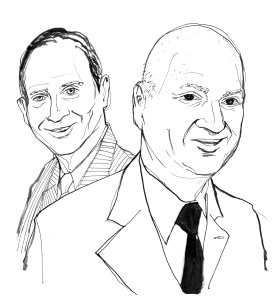
As the head of the accounting firm Rosen Seymour Shapss Martin & Company’s Real Estate Service Group, Neil Sonenberg, 52, left in the illustration, has crunched numbers for a real estate industry in transition. He and Martin Greenberg, 53, a managing partner, talked about how landlords best weathered the recession and what they can do in terms of incentives to capitalize on the upturn.
The Commercial Observer: Let’s get right to the point: How is the bottom line looking for the city’s real estate industry right now?
Mr. Greenberg: I see real estate starting to come back. Our real estate clients in the city, their rents are coming up from what they were last year, and there’s more action in the leasing market. And I think it has turned a corner.
When did you begin to see that change?
Mr. Greenberg: I would say four or five or six months ago.
Mr. Sonenberg: But it’s still cautious. I mean, we’ve seen a little bit of a change, but it’s still a cautious market. Things are taking off like gangbusters. We do a lot of residential real estate as well as commercial real estate, and residential resales are still on the slow side–especially on the Upper East Side of Manhattan, which is where we have a big concentration.
I would imagine you saw a flood of new business at the beginning of the downturn.
Mr. Sonenberg: I don’t know about a flood of business, but, because we have a very, very good real estate department in our firm, we continue to get new business every year because of our reputation.
Mr. Greenberg: We stay ahead of the curve is the truth of the matter. Just because it was a downturn, we didn’t see an influx. We have pretty steady new business coming in here all the time.
As a matter of fact, before this phone call, believe it or not, I just got off the phone with two potential new clients–two families that are disgruntled, frankly, with the advice they’d been getting. One is actually in dispute with another family, and they’re coming to us! We get this all the time.
It’s not whether it’s a downtrend in the marketplace or an uptrend. We’re pretty consistent because we’re out there in the market and we’re giving good advice.
At the start of the downturn, what kind of questions were clients asking?
Mr. Sonenberg: ‘What could we do not to give up our properties? What could we do to stay ahead, to keep us out of trouble?’ We always have advised our clients, from day one, ‘Do not overleverage.’ We like to take a conservative approach when buying real estate, and the real estate owners who overleverage themselves, those are the guys who wound up getting into trouble and giving back their property to the bank.
Mr. Greenberg: I mean, we also advise clients that during the low point, frankly, opportunities arise.
We were involved with a huge real estate family, and we assisted them in a very large purchase here in midtown Manhattan with a large commercial office building because the opportunity, frankly, was right. You have to know how to read the tea leaves, and when the opportunity arises we jump in. And we worked well with the client, and they were able to bring their deal to fruition. The truth of the matter is that they bought about two and a half years ago, and there’s been an increase in that property of maybe one-third already. It’s about a $50 million to $60 million increase in that property.
With regard to lease escalations, what are you seeing? And what are you advising?
Mr. Sonenberg: We do see leases increasing now. That’s built in through any new type of deal. I mean, real estate …
Mr. Greenberg: You still have to run your buildings, so if someone has a 2005 base year, and now it’s 2011, they’re starting to get the escalation for 2010. The owner still has to run the business, and the buildings that are full, they didn’t cut back on services-so the escalations continue to rise on a small level; not major, but on a small level because inflation hasn’t been crazy. So the escalations we’ve seen go up slightly, that’s what I’ve seen.
How are you advising owners on incentives?
Mr. Sonenberg: I mean, economic development zones down on Wall Street, we’ve advised clients to take advantage of those. But the federal government is offering extensive economic development zones where you can get large amounts of reductions for labor people that you hire onto your payroll. You can get $3,000 a labor person if you do it in these economic development zones–especially down on Wall Street. Also, a lot of people don’t know New York State’s offering for security guards. That’s also a $3,000 tax credit if you employ security guards that go through a certain type of training with Homeland Security; and people who take advantage of this are very, very happy.
But you have to follow the rules of the law here. If you don’t, you blow yourself up, and you won’t be entitled to it. And, meanwhile, there are all sorts of green zone credits now, by the way. … You have to use certain types of material and make improvements for space. That’s LEED certification, and making certain that you get credits for those types of things.
And one thing that’s overlooked by a lot of our competitors–and we’re giving you all our trade secrets–is, frankly, tenant improvement. Obama signed a new law at the end of last year that allows for tenant improvements as long as it’s placed in the lease. You have to get a dollar-for-dollar write-down for tenant improvements. So that’s just another thing we’re on top of.
Mr. Greenberg: I’m telling you: We’re on the cutting edge!
jsederstrom@observer.com



